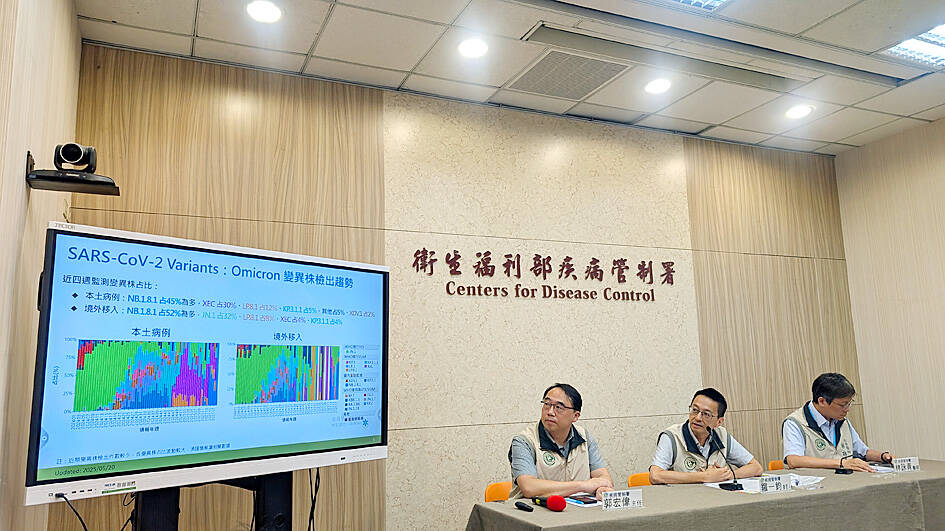Weekly hospital visits for COVID-19 surged by 88 percent last week, the Centers for Disease Control (CDC) said yesterday, adding that the NB.1.8.1 subvariant of the SARS-CoV-2 virus has become the dominant strain spreading domestically.
Hospitals reported 19,097 visits for COVID-19, as weekly cases have increased for five consecutive weeks, CDC Epidemic Intelligence Center Director Guo Hung-wei (郭宏偉) said.
Of the 93 severe COVID-19 cases confirmed last week, 88.2 percent were not vaccinated with the JN.1-adapted COVID-19 vaccine, he said, adding that four people died.

Photo: CNA
Among the 330 severe COVID-19 cases reported this year, as of Monday, 74.2 percent were people aged 65 or older, 84 percent had underlying health conditions and 90 percent did not get the JN.1-adapted vaccine, Gou said.
Virus surveillance data from the past four weeks showed that the NB.1.8.1 subvariant has become the dominant strain locally, followed by the XEC and LP.8.1 subvariants, he said.
Aside from the Americas, global test positivity rates for the SARS-CoV-2 virus have been increasing, with the LP.8.1 subvariant being reported as the dominant strain globally, he said.
The youngest severe case last week was a 10-month-old girl who did not have underlying health issues, but was also not vaccinated, CDC physician Lin Yung-ching (林詠青) said.
She first had cold-like symptoms, then developed a loss of appetite, shortness of breath and croup, Lin said.
The girl has been hospitalized in an intensive care unit for four days and is still undergoing treatment, he added.
Local COVID-19 infections are rapidly increasing, with weekly hospital visits and severe cases reaching the highest this year, CDC Deputy Director-General Philip Lo (羅一鈞) said.
“We estimate that the peak will be in mid or late June,” he said. “Estimated hospital visits during the peak period are projected to be between 55,000 and 56,000 per week.”
The estimated peak weekly visits are only about half the number of the peak period during the previous wave of infections in summer last year, but people should still not let their guard down, Lo said.
The Ministry of Health and Welfare and the CDC have also made preparations in response to the growing infections, including making sure there are enough vaccines, medication and test kits, he said.
More than 17,000 people got vaccinated against COVID-19 last week, the highest weekly number in three months, and several local health departments have reported increased vaccine demand, he said.
Although 31,000 doses have been distributed this week, the CDC plans to distribute more on Friday, he said, adding that about 3.1 million doses are available.
The CDC also secured medications, including Remdesivir, Paxlovid and Molnupiravir, for the estimated usage of between five months to a year, while it also has open-ended contracts to import more if needed, Lo said.
The Food and Drug Administration last week asked domestic manufacturers to increase production of rapid test kits for at-home and hospital use, and it also contacted the nation’s four major convenience store chains and pharmacy chains to make test kits more accessible for purchase, he said.

The Grand Hotel Taipei on Saturday confirmed that its information system had been illegally accessed and expressed its deepest apologies for the concern it has caused its customers, adding that the issue is being investigated by the Ministry of Justice Investigation Bureau. The hotel said that on Tuesday last week, it had discovered an external illegal intrusion into its information system. An initial digital forensic investigation confirmed that parts of the system had been accessed, it said, adding that the possibility that some customer data were stolen and leaked could not be ruled out. The actual scope and content of the affected data

‘LIKE-MINDED PARTNER’: Tako van Popta said it would be inappropriate to delay signing the deal with Taiwan because of China, adding he would promote the issue Canadian senators have stressed Taiwan’s importance for international trade and expressed enthusiasm for ensuring the Taiwan-Canada trade cooperation framework agreement is implemented this year. Representative to Canada Harry Tseng (曾厚仁) in an interview with the Central News Agency (CNA) said he was increasingly uneasy about Ottawa’s delays in signing the agreement, especially as Ottawa has warmed toward Beijing. There are “no negotiations left. Not only [is it] initialed, we have three versions of the text ready: English, French and Mandarin,” Tseng said. “That tells you how close we are to the final signature.” Tseng said that he hoped Canadian Prime Minister Mark Carney

POSITIVE DEVELOPMENT: Japan and the US are expected to hold in-depth discussions on Taiwan-related issues during the meeting next month, Japanese sources said The holding of a Japan-US leaders’ meeting ahead of US President Donald Trump’s visit to China is positive news for Taiwan, former Japan-Taiwan Exchange Association representative Hiroyasu Izumi said yesterday. After the Liberal Democratic Party’s landslide victory in Japan’s House of Representatives election, Japanese Prime Minister Sanae Takaichi is scheduled to visit the US next month, where she is to meet with Trump ahead of the US president’s planned visit to China from March 31 to April 2 for a meeting with Chinese President Xi Jinping (習近平). Japan and the US are expected to hold in-depth discussions on Taiwan-related issues during the

President William Lai (賴清德) yesterday bestowed one of Taiwan’s highest honors on Saint Vincent and the Grenadines (SVG) Ambassador Andrea Clare Bowman in recognition of her contributions to bilateral ties. “By conferring the Order of Brilliant Star with Grand Cordon on Ambassador Bowman today, I want to sincerely thank her, on behalf of the Taiwanese people, for her outstanding contribution to deepening diplomatic ties between Taiwan and SVG,” Lai said at a ceremony held at the Presidential Office in Taipei. He noted that Bowman became SVG’s first ambassador to Taiwan in 2019 and